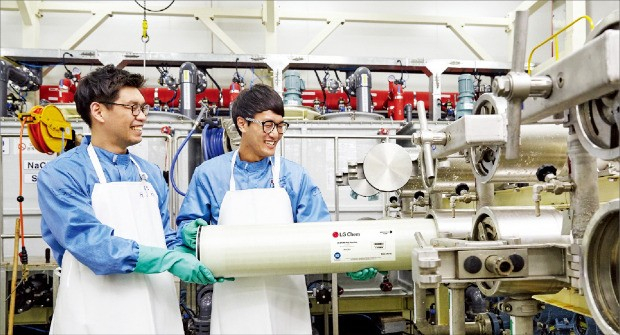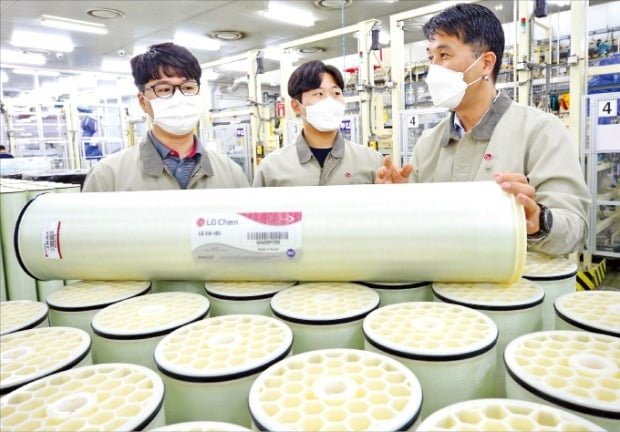Water technology
LG Chem's water filter business thrives amid high demand in Middle East
By May 20, 2021 (Gmt+09:00)
3
Min read
Most Read
LG Chem to sell water filter business to Glenwood PE for $692 million


KT&G eyes overseas M&A after rejecting activist fund's offer


Kyobo Life poised to buy Japan’s SBI Group-owned savings bank


StockX in merger talks with Naver’s online reseller Kream


Meritz backs half of ex-manager’s $210 mn hedge fund



LG Chem Ltd., the parent company of South Korea’s leading battery maker LG Energy Solution Co., is enjoying a strong rise in demand for its water purification filters.
According to the chemical company last week, its reverse osmosis (RO) filter plant in Cheongju, North Chungcheong Province, has been operating at 100% capacity, the highest rate since it was built in 2015.
The RO filters are used to make seawater into fresh water without salt. The demand for these filters has risen recently, with a higher number of seawater desalination projects kicking off in different parts of the world.
“We increased the price of our RO filters by 30%. But the number of orders is still soaring, with our current capacity insufficient to meet all the volume,” said LG Chem.
The company says that the Middle Eastern countries, such as Saudi Arabia, the United Arab Emirates and Egypt, are the main drivers behind the recent hike in demand. These countries in the early 2000s had built a large number of seawater desalination plants, which have an average lifespan of 20 years.
With the life cycle of these plants coming to a close, the countries in the Middle East are newly equipping the RO filters in mass-scale to their plants, which previously used the evaporation method for desalination.
LG Chem said that the RO filters are now the preferred method in the industry over evaporation due to lower cost and less impact on the environment. The previously common multi-stage flash distillation (MSF) and multi-effect distillation (MED) methods, which evaporate seawater to produce fresh water, consume more energy and also emit more pollutants to the air.
LG Chem said that China and other Asian countries are also increasing their volume of RO filter purchases. The company explained that the countries in Asia are recently ramping up their production of fresh water to be supplied for industrial uses.
South Korea is also using more of the RO filters. Korea Hydro & Nuclear Power Co. has kicked off the country’s first public sector-led seawater desalination project in South Chungcheong Province.

Market analysts say that the RO filter demand is projected to rise even further, as high-tech sectors like the semiconductor and battery industries need ultrapure water volume in their manufacturing processes.
According to the market intelligence company Global Water Intelligence, the market size for RO filters is expected to grow by around 30% from 1.16 trillion won ($1.02 billion) to 1.51 trillion won ($1.33 billion) in 2024.
LG Chem entered the RO filter segment in 2014 by acquiring an American startup NanoH2O. NanoH2O has a patent on Thin-Film Nanocomposite (TFN) technology sed for seawater and brackish water reverse osmosis.
The company says its competitive edge over rivals is simple: making better quality products and selling them at lower price. LG Chem’s RO filters have a higher rate of desalination, at 99.89%, than filters manufactured by DuPont and Toray, at 99.8%.
The 99.89% rate of desalination means that once the seawater or brackish water goes through the company’s RO filter, only 11 out of every 10,000 sodium chloride particles remain in the water. In comparison, 20 particles remain using competing filters, with a rate of 99.8%.
While it seems a small discrepancy, LG Chem says the difference is big for clients, which are filtering an immense volume of water every day.
LG Chem’s RO filter revenue surpassed 100 billion won ($88.3 million) for the first time in 2019. The company says that the revenue generated in the RO filter segment is expected to reach 150 billion won ($132.5) in 2021. The company is one of the top three global RO filter makers along with DuPont of the US and Toray of Japan.
“Water shortage is a global crisis. LG Chem’s water business is likely to be the company’s next growth engine after its battery business, in the next decade or two,” said Hyung Hoon, the managing director of LG Water Solutions, LG Chem’s water business unit.
Write to Jae-kwang Ahn at ahnjk@hankyung.com
Daniel Cho edited this article.
More to Read
-
 ESG investmentLG Chem to invest $134 mn in incubator fund for firms with ESG tech
ESG investmentLG Chem to invest $134 mn in incubator fund for firms with ESG techMay 11, 2021 (Gmt+09:00)
2 Min read -
 EarningsLG Chem delivers Q1 earnings surprise on cash-cow petrochem business
EarningsLG Chem delivers Q1 earnings surprise on cash-cow petrochem businessApr 28, 2021 (Gmt+09:00)
3 Min read -
 Carbon materialsLG Chem expands carbon nanotube production with new plant
Carbon materialsLG Chem expands carbon nanotube production with new plantApr 14, 2021 (Gmt+09:00)
2 Min read -
 Bond issuesLG Chem to issue over $1 bn in bonds; largest amount ever
Bond issuesLG Chem to issue over $1 bn in bonds; largest amount everFeb 15, 2021 (Gmt+09:00)
2 Min read
Comment 0
LOG IN


